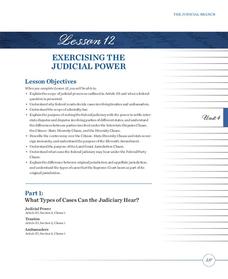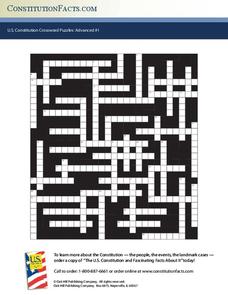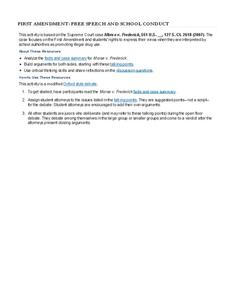Judicial Learning Center
Your 4th Amendment Rights
Americans love to learn about their rights, especially those that protect them from the government's power to invade their privacy. Young people are especially engaged by this topic. An informative lesson explores four Supreme Court...
Judicial Learning Center
Your 1st Amendment Rights
Why should classes care about the First Amendment? An engaging lesson serves as a powerful tool for answering just that. As all four cases in the lesson relate directly to freedom of expression in schools, young scholars explore the...
Judicial Learning Center
The Constitution and Rights
What's the right way to teach young historians about the Bill of Rights? Many an instructor has asked this question when pondering lesson plans over the US Constitution. The Constitution and Rights is a nifty resource that provides a...
National Constitution Center
Explore Rights Around the World
How has the American Bill of Rights influenced the rest of the world? An interactive web activity helps individuals see the similarities between countries' bills of rights. A text-to-text tool compares the American Bill of Rights to...
National Constitution Center
The Development and Application of the First Amendment
What are the limits on freedom of speech? While a cherished right in the Constitution, it is not unbridled. Budding historians consider what checks should exist on this liberty using news stories, court cases, and College Board prompts.
National Constitution Center
Federalism, the Commerce Clause, and the Tenth Amendment
How do the state and federal governments relate to each other? The Constitution has a lot to say about that! Using an interactive online tool, pupils explore the Tenth Amendment. They apply their knowledge to political cartoons and news...
National Constitution Center
Voting Rights since the Fifteenth Amendment
What does it mean to have the right to vote? To what extent have interpretations of the Fifteenth Amendment changed over time? Young historians examine and analyze primary source documents, an interactive website, and historical analysis...
National Constitution Center
Civil Liberties and Rights Worldwide
How do governments differ in how they protect human rights? While the United States prides itself on its Bill of Rights, other countries have their own ways of protecting citizens' liberties. An interactive website, paired with...
PBS
Ken Burns: Jackie Robinson - A Journey Back to Separate but Equal Conditions
Baseball great Jackie Robinson fought for social justice. His efforts to push for equal access are detailed in an episode from from the Ken Burns: The Jackie Robinson Collection. After viewing the clip, class members engage in a series...
Ashbrook Center at Ashland University
Bill of Rights
Do citizens need protection from the federal government? Scholars investigate why the framers of the Constitution created the first 10 amendments and what these amendments mean to citizens of the United States more than 200 years later....
State Bar of Texas
Gideon v. Wainwright
How does a trial begin without a lawyer for the defendant? The 1963 Supreme Court case Gideon v. Wainwright serves as the backdrop for the study of the rights of the accused. Scholars use a short video along with paired discussion and...
State Bar of Texas
Roe v. Wade
At what point does the right of privacy end and the government begin? Scholars research rights under the Ninth Amendment to the Constitution. Using the 1973 Roe v. Wade Supreme Court case as a starting point, along with small group work...
PBS
Explicit and Implicit Language – Interpreting the Meaning of the Fourteenth Amendment
How do Supreme Court justices interpret amendments to the Constitution? The resource helps answer that question by discussing how people use explicit and implicit language to interpret the meaning of the Fourteenth Amendment. Learners...
Heritage Foundation
Exercising Judicial Power
We should all do more exercising, but should the judicial branch as well? High schoolers develop their understanding of what powers the judicial branch carries because of the US Constitution, as well as where their limits lie in the...
National Endowment for the Humanities
James Madison: Raising an Army—Balancing the States and the Federal Government
To war! To war! Every nation in the history of the world has had to deal with warfare on some level. Scholars go through a series of activities and discussions surrounding the development of the Constitution to help them better...
National Endowment for the Humanities
Lesson 2 James Madison: The Second National Bank—Powers Not Specified in the Constitution
How much power is too much power for the federal government? Scholars use primary documents and constitutional research in groups to analyze the creation of the Second National Bank under James Madison. This is the second lesson of a...
Library of Virginia
Emancipation and the Thirteenth Amendment
Why didn't the Emancipation Proclamation free all slaves? Young historians study primary source documents including Lincoln's proclamation and the 13th Amendment to the United States Constitution. Groups also investigate the three...
Center for Civic Education
To Amend or Not to Amend, That's Been the Question...Many Times
Looking for some ideas for how to celebrate September 17, Constitution Day? Check out a packet that focuses on the factors that are considered in the amendment process. Class members examine the amendment process and the types of...
Constitution Facts
U.S. Constitution Crossword Puzzles: Advanced #1
What do Boston Harbor, the Electoral College, and Chief Powhatan have in common? They all represent vital moments in American history—and they are all clues in a thorough and challenging crossword puzzle about the United States...
Center for Civic Education
Historical Analysis of Constitutional Amendments
Each of the 27 Amendments to the U.S. Constitution were adopted within specific economic, political, social or cultural, and international contexts. As part of their Constitution Day/Week studies, seniors investigate these factors for...
Channel Islands Film
Eminent Domain
After viewing the documentary The Last Roundup, a documentary about the transitioning of Santa Rosa from a privately own island to a National Park, class members debate the takings clause of the Fifth Amendment that permits the...
Administrative Office of the US Courts
Snyder v. Phelps
Does the Westboro Baptist Church have the protection of the Constitution when protesting military funerals? High schoolers examine the 2011 Supreme Court case of Snyder v. Phelps before comparing the situation to a fictional scenario of...
Administrative Office of the US Courts
Morse v. Frederick
If you stop a student from expressing views that advocate drug use, are you violating their right to free speech? Use the 2007 Supreme Court case Morse v. Frederick to discuss a nuanced interpretation of the First Amendment. Learners...
Constitutional Rights Foundation
Naturalized Citizens and the Presidency
Article II, Section 1 of the U.S. Constitution takes center stage in a lesson plan that asks class members to assume the role of state senators, debate a resolution to amend the U. S. Constitution to permit naturalized citizens to run...

























